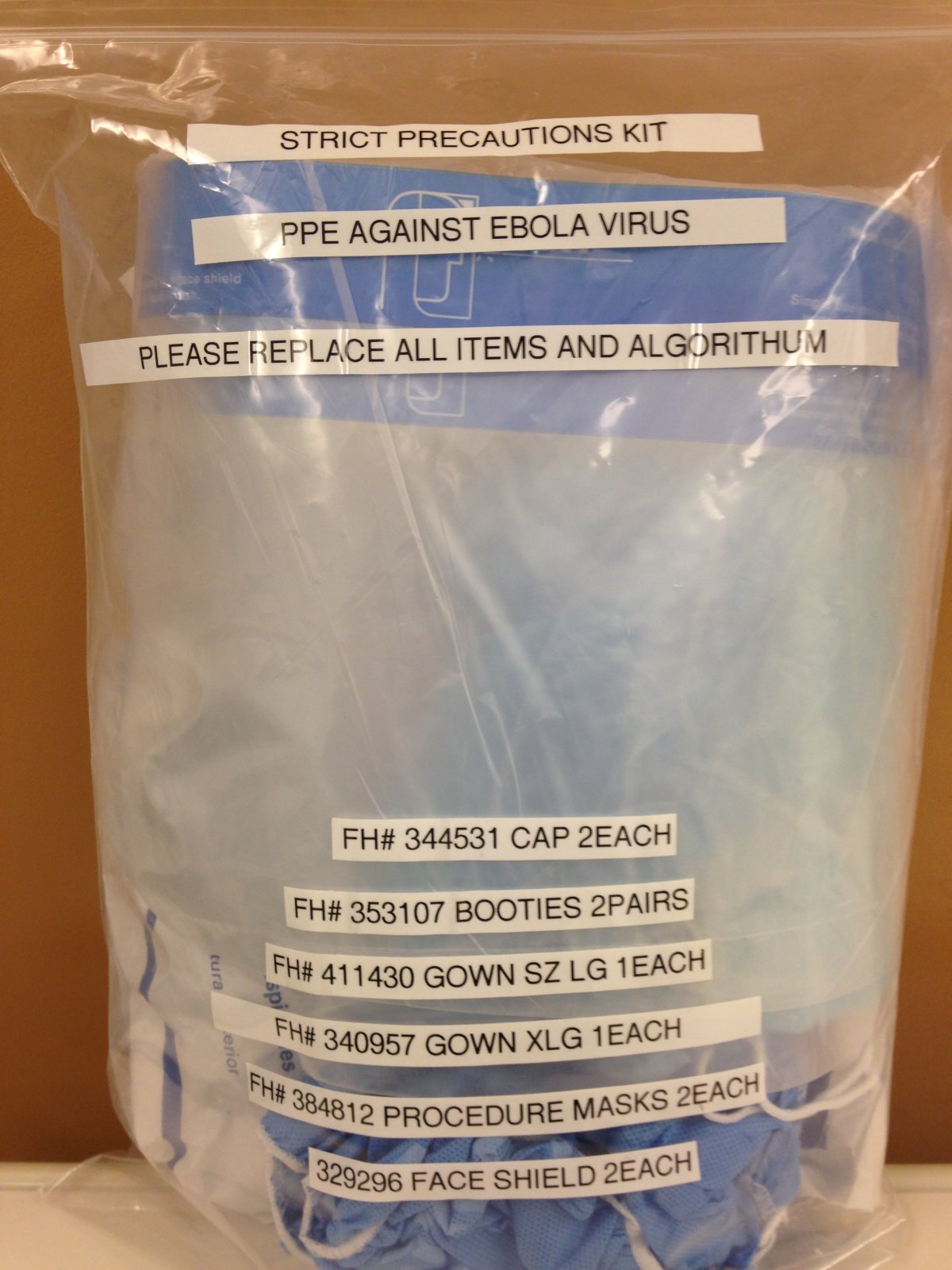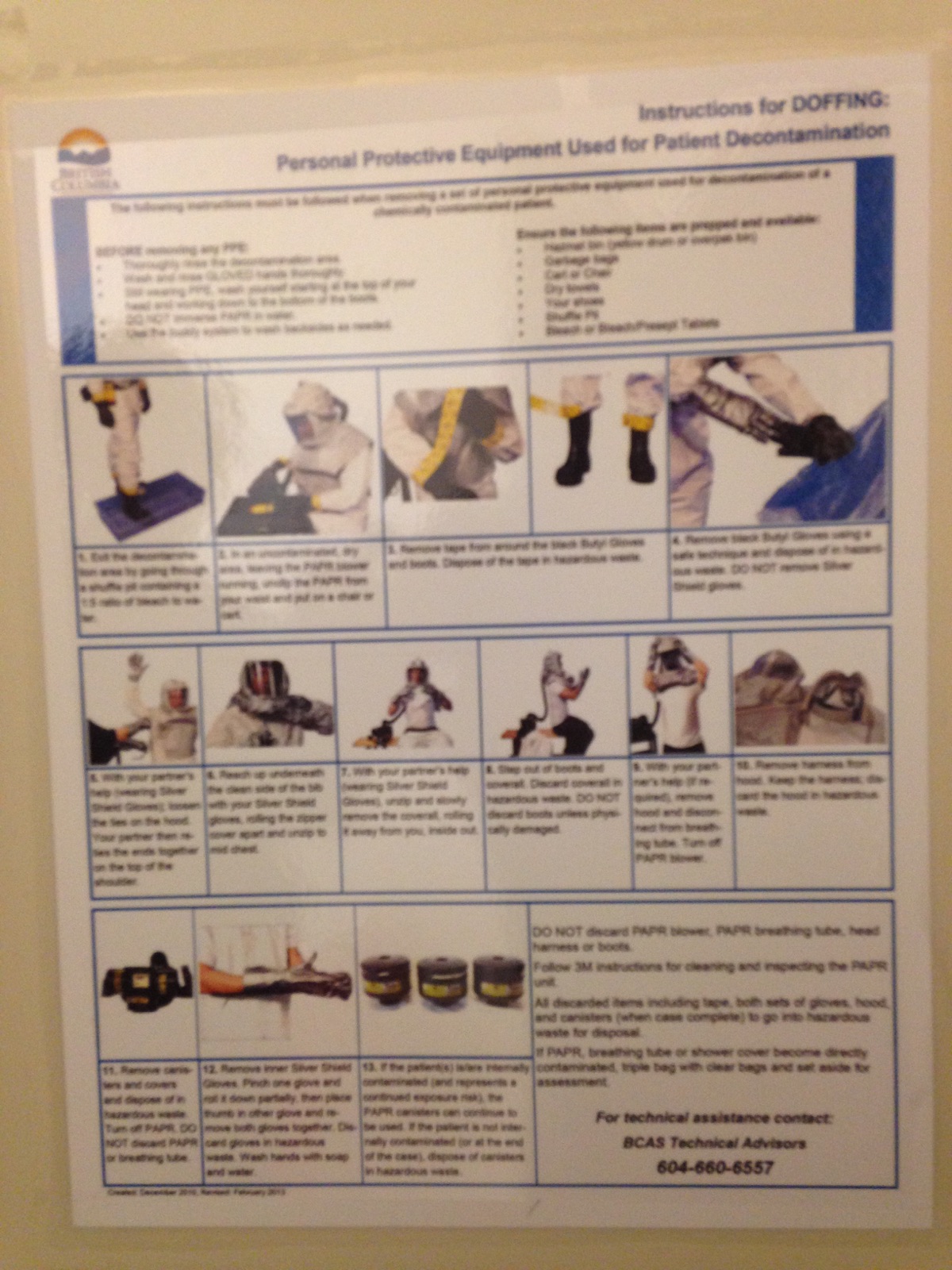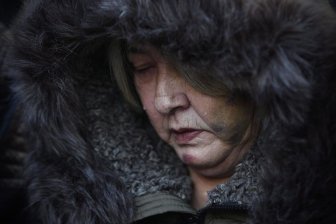WATCH: BC nurses say they’re still not prepared for the arrival of Ebola, while health officials say preparations are in effect. Keith Baldrey has the details.

VANCOUVER – Three photos of an Ebola preparedness kit, a decontamination / isolation room and a small sign showing how to use protective gear has the BC Nurses’ Union concerned about how ready B.C. is to fight Ebola.
They have already sounded the alarm saying they have not received enough training or the proper equipment to handle an Ebola case, and now the photos appear to back up their claims.
One photo appears to show an Ebola preparedness kit, called ‘PPE Against Ebola Virus’. It is not known what hospital it came from, but it did come from one in the Fraser Valley and was reportedly very hard to find.
A second photo given to Global News shows what is considered to be a decontamination / isolation room in a Fraser Health hosptial, but it is filled with other pieces of junk.
- ‘Beast Mode’: Former Canuck Ryan Kesler back in Vancouver for Game 2 vs. Nashville
- Woman shares carjack nightmare: ‘I can’t believe this is happening in Victoria’
- No Demko but plenty of spirit as fans prepare for Game 2 of Canucks playoff run
- Caught on video: B.C. firefighter survives hit-and-run outside his own home
A third photo shows a small sign hanging up displaying protective gear procedures.
The BC Nurses’ Union president says 60 per cent of major hospitals in our province are not up to speed with proper infection control procedures and more communication and training is needed.
“It’s one thing to have papers and policies and procedures on just that, on paper, but it’s another thing to enact them on the front line, on the ground level,” said Gayle Duteil, BC Nurses’ Union president. “And that’s not being done, nor is it being communicated.”
WATCH: President of BC Nurses’ Union Gayle Duteil talks about Ebola preparedness
Health Minister Terry Lake issued a statement Wednesday morning, reassuring British Columbians that B.C. is ready to deal with Ebola.
He says B.C. is using the top international infection control systems and procedures.
“B.C. health authorities have put in place internationally accepted infection control systems and procedures that reflect those being used by experts around the world. These are the same standards being used by the Centers for Disease Control in Atlanta Georgia; in the U.S. that have cared for Ebola virus disease cases; and by Medecins Sans Frontieres, operating in West Africa,” says Lake.
He says that B.C. is leaning on its experience in managing the SARS outbreak of 2003, and the H1N1 outbreak of 2009.
There have been three people tested for Ebola so far in B.C. and all the tests have come back negative.
Fraser Health has released the following statement in response to the situation:
“We understand that our nurses and hospital staff, as well as the public, are concerned about the risk of Ebola. Fraser Health, like all health authorities and officials across Canada, is taking the Ebola situation seriously. We recognize the importance of keeping staff and the people we serve safe. We have a responsibility to provide timely and accurate information to our staff and communities.
There are no confirmed cases of Ebola in Fraser Health or British Columbia. Further, there are currently no patients under investigation for Ebola virus disease in Lower Mainland hospitals. The patients that have presented in recent weeks were quickly ruled out by screening following protocols that are in place.
The risk of Ebola to British Columbians is extremely low. Even if a true case arrives in Fraser Health, we are confident that the case would be quickly isolated and managed. We are watching and learning from what is happening around the world – refining our protocols and procedures to ensure our staff and the people we serve are as safe as possible for the unlikely event that an Ebola case arrives in Fraser Health. We are also participating in Provincial committees led by Dr. Perry Kendall with a goal to ensure that the Province is ready should an Ebola case arrive in BC.
Infection Control and Public Health have been preparing for months on how to deal with a suspect Ebola case. Training has been provided for front line staff and will continue to be rolled out over the coming weeks. Simulation training is underway at Surrey Memorial Hospital, which has been designated as the site in Fraser Health to manage any suspect, or confirmed, cases of Ebola in our region. The initial focus is the correct and safe technique for putting on and removing personal protective equipment. Further training is being developed to simulate the management of suspect and confirmed cases, and will be extended to the whole health authority.
Additionally, all family physicians in the region have been sent information about Ebola and how to manage suspect cases who may present in their offices.
Many of our sites have developed a kit to show staff the different personal protective items required for precautions against Ebola. It includes information about putting on and removing the equipment and protective clothing. The kit serves as an example for staff. All emergency departments have well-stocked carts and/or a supply area that includes all the required components. All hospitals have extra equipment stored at the site in the event the emergency department requires it. All isolation equipment is disposable which is considered best practice in this situation. The gowns are made with a high grade fluid-impervious fabric that is extremely strong.
We continue to encourage all staff members who feel concerned about their preparedness to speak directly with their Managers to ensure further training and information is made available to them.”
Let us know what you think: vote in our poll






Comments